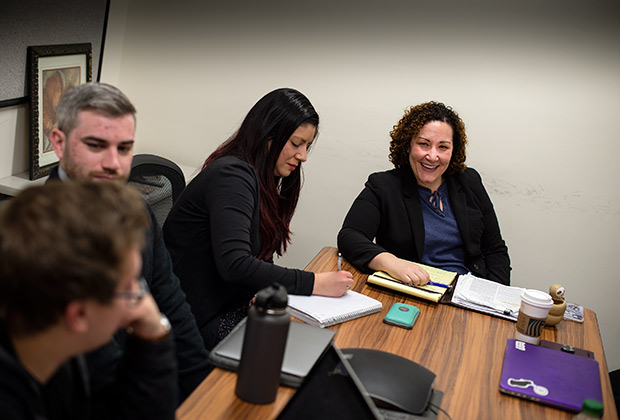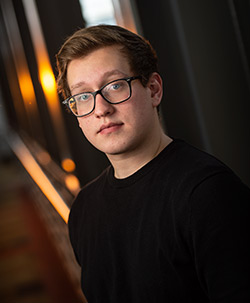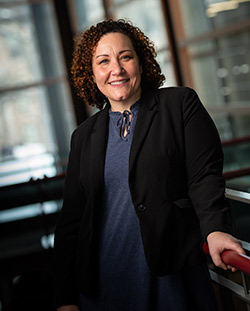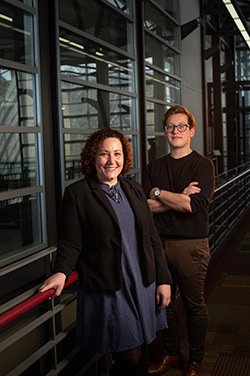UW restraining-order clinic offers life-changing help to survivors
By: Michaela Paukner, [email protected]//March 5, 2020//
UW restraining-order clinic offers life-changing help to survivors
By: Michaela Paukner, [email protected]//March 5, 2020//

Ryan Poe-Gavlinski and her students at UW Law School are doing the sort of work many practicing attorneys can’t. Poe-Gavlinski is the director of the school’s VOCA Restraining Order Clinic, which helps victims obtain restraining orders in cases involving domestic abuse, harassment and child abuse.
The semester-long course not only gives students experience with family law but also provides survivors, many of whom are living on low incomes, with life-changing assistance at no cost. Poe-Gavlinski said this is the sort of help that’s rarely on offer at a pro bono or reduced rate.

“Judges say, ‘There’s no one I can recommend to take on these kinds of cases,’” Poe-Gavlinski said. “A lot of attorneys just don’t have the time to put in, and victims don’t usually have the money.”
Victims are known to increase their chances of a good outcome when they enlist lawyers to help them file restraining orders. Studies cited by UW Law have found that about 83% of victims with legal representation go on to obtain a restraining order. For those working on their own, the comparable figure is only 32%.
“It’s really hard to talk for yourself sometimes, especially as someone who’s just been traumatized,” said Brandi Magel, legal advocate at the Rock County YWCA. “To have the duty of representing yourself on top of that, it’s very stressful.”
Partnering students & survivors
UW Law School developed the VOCA clinic with the Wisconsin Department of Justice’s Office of Crime Victim Services and Rep. Cody Horlacher, a Republican from Mukwonago. A three-year Victims of Crime Act grant from the DOJ and a match from UW Law paid for the full-time program from 2019 to 2021.
Students taking the course work with clients in Dane, Sauk, Jefferson and Rock counties. Referrals come from victim-witness advocates at prosecutors’ offices and other victim-rights organizations like the Rock County YWCA.
“It’s been an absolute blessing,” Magel said. “It is very empowering for (survivors) just to be able to have someone who’s standing up for them. They’re appreciative of help in any little way.”
Poe-Gavlinski and her students assisted 62 people in the clinic’s first year. Students gathered facts, helped clients file paperwork, sat in on hearings and coached survivors who represented themselves in court.
“We can’t go to court with everyone,” Poe-Gavlinski said, “so what we do is a trial prep meeting or call. A lot of times our clients call us back and say, ‘I was completely over prepared!’ The jubilation in their voices when they tell us that is always really cool.”
Noah Tylenda, a second-year UW Law student, started working with the clinic in August. He walked clients through their legal options and explained how the clinic could — or sometimes couldn’t — help them.
“We do our best to understand what their goals are in court and outside of representation and give them their options,” Tylenda said. “We inform them and let them decide what’s best for them.”
In some cases, Poe-Gavlinski or a certified student represents a client in court. Tylenda plans to take the course again now that he’s reached the 45 credits he needs for certification. He has already got a taste of the difficulties that lie ahead.
“We’ve had some tough ones in terms of evidence,” Tylenda said. “(But) when you win those cases where you don’t have great evidence, especially when you find an exception to a hearsay rule or something like that, it’s always rewarding to get somebody a restraining order that you think they deserve.”
Teaching trauma-informed lawyering

Working with victims requires some unusual abilities — often of the sort that many professional attorneys don’t possess, Poe-Gavlinski said. The clinic teaches so-called trauma-informed lawyering, which helps students understand survivors’ behavior.
“Working with victims is hard,” Poe-Gavlinski said. “If you don’t realize what’s happening, it may look like your client’s not telling the truth or trying to make up facts as they go.”
Survivors’ stories often come out like a puzzle, Poe-Gavlinski said. Victims tend to need time and more than one opportunity to talk about what happened before they can make sense of it all.
“One of the things that we teach students is that sometimes you just need to sit in silence,” Poe-Gavlinski said. “Sometimes our clients need time to gather up the courage to say something. We may be the first time someone is even talking about this out loud.”
Even lawyers equipped with the right knowledge can find working with survivors unpredictable. Poe-Gavlinski and her students encountered some unexpected hurdles last semester.
“(Before the) court proceeding, the client had been completely up front and had a great relationship with our student,” Poe-Gavlinski said. “Then during the hearing, because the opposing party was there, the person completely shut down, and we couldn’t get a word out.”
Regardless of a hearing’s outcome, future lawyers tend to find that having a chance to encounter these sorts of situations when they’re still students helps them prepare for their careers.
“When they go into practice for themselves, we hope they’ll take what they learned from us and assist in this realm,” Poe-Gavlinski said. “There is just not enough legal assistance for victims, especially in the realms of family law and restraining orders.”
Avoiding secondary trauma
Something else Poe-Gavlinski hopes students take from the clinic: An ability to manage stress and come to cope with the often horrific details presented in client cases. As clients tell their stories, students sometimes feel shock, Poe-Gavlinski said.
“(They’re) realizing that people come from different backgrounds and beliefs and are in a totally different place,” Poe-Gavlinski said. “They’re learning to deal with that reality.”
Throughout the semester, students keep a journal to give them an outlet for their emotions. Poe-Gavlinski also talks about the benefits of mediation and other ways of promoting mental health.
“It’s something that’s not traditionally done in a law class,” Poe-Gavlinski said. “As we see the rising levels of attorneys who have depression and issues with substances and things like that, wellness is definitely important as we practice. What we don’t want is secondary trauma to students and people who practice because it’s an easy trip to burnout.”
Poe-Gavlinski said students are usually willing to talk about their feelings during class, and she’s always ready to listen if they want to speak to her directly. She said that even though she has yet to encounter a situation she couldn’t cope with, the school nonetheless has counseling services for students.
Changing communities

Thanks to students’ efforts, the clinic has made a difference. Poe-Gavlinski said the students have taken a lot of weight off county clerks, and victim-witness advocates have spoken of similar relief.
At the Rock County YWCA, Magel saw a 46 percent increase in clients in the first six months after Wisconsin expanded its Lethality Assessment Program, which is designed to connect victims with services sooner.
“I was getting so swamped with restraining orders,” Magel said. “The law clinic has been a huge help to this influx of better screening tools. It’s taking a huge burden off sexual assault service providers.”
Despite its benefits and recognition — the clinic won an innovation award from the State Bar of Wisconsin in 2019 — its future is unclear. The VOCA grant only provides money through 2021, and Poe-Gavlinski said she’s not sure what will happen if more isn’t forthcoming.
The clinic’s partners now worry that, if it all goes away, their clients won’t have any way to obtain affordable legal representation.
“The law clinic has been a blessing to the clients we serve,” Magel said. “Working with them is a much-needed service in our community. I can’t imagine them not being a part of this effort to make clients and their families safer.”
Poe-Gavlinski said, whether or not the clinic receives more money, she hopes more practicing lawyers will consider offering pro bono or reduced-rate family-law services.
“Even with our clinic, there are still not enough people doing this work,” Poe-Gavlinski said. “We hope that we can be doing this forever.”
Legal News
- Former law enforcement praise state’s response brief in Steven Avery case
- Eric Toney announces re-election bid for Fond du Lac County District Attorney
- Former Wisconsin Democratic Rep. Peter Barca announces new bid for Congress
- Republicans file lawsuit challenging Evers’s partial vetoes to literacy bill
- More human remains believed those of missing woman wash up on Milwaukee Co. beach
- Vice President Harris returning to Wisconsin for third visit this year
- Wisconsin joins Feds, dozens of states to hold airlines accountable for bad behavior
- Trump ahead of Biden in new Marquette poll
- Bankruptcy court approves Milwaukee Marriott Downtown ‘business as usual’ motion
- New Crime Gun Intelligence Center to launch in Chicago
- Arrest warrant proposed for Minocqua Brewing owner who filed Lawsuit against Town of Minocqua
- Wisconsin Supreme Court justices question how much power Legislature should have
WLJ People
- Power 30 Personal Injury Attorneys – Russell Nicolet
- Power 30 Personal Injury Attorneys – Benjamin Nicolet
- Power 30 Personal Injury Attorneys – Dustin T. Woehl
- Power 30 Personal Injury Attorneys – Katherine Metzger
- Power 30 Personal Injury Attorneys – Joseph Ryan
- Power 30 Personal Injury Attorneys – James M. Ryan
- Power 30 Personal Injury Attorneys – Dana Wachs
- Power 30 Personal Injury Attorneys – Mark L. Thomsen
- Power 30 Personal Injury Attorneys – Matthew Lein
- Power 30 Personal Injury Attorneys – Jeffrey A. Pitman
- Power 30 Personal Injury Attorneys – William Pemberton
- Power 30 Personal Injury Attorneys – Howard S. Sicula











